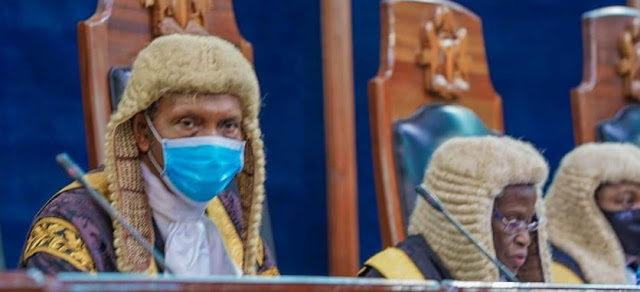 |
| Olabode Rhodes-Vivour (right) |
Honourable Justice Olabode Rhodes-Vivour has retired from the Supreme Court after clocking 70 years old.
A valedictory court session was held in his honour on Monday.
With Rhodes-Vivour’s retirement, the number of justices in the apex court has reduced to 18 while Mary Ukaego Peter-Odili becomes the second most senior justice of the apex court.
At the valedictory session, the Chief Justice of Nigeria, Ibrahim Muhammad, said the retired justice is “physically energetic and never gets frightened by any form of challenges.
“His amiable disposition and reticent outlook have literally made him a gentle tiger in the temple of justice.”
On his part, Rhodes-Vivour said, “I have a testimony, not once was I ever absent from work as a judge due to illness. I did have health challenges, but they were resolved during vacation. All medical procedures were uneventful.
“It is with humility that I have and will continue to give thanks praise and glory to the almighty God. The Lord has been good to me, and I will forever be thankful.”
According to information available on the Supreme Court’s website, between 1963 and 1968, Honourable Justice Bode Rhodes-Vivour attended St. Gregory’s College, Lagos. In 1970, he wrote and passed his Advanced Level Certificate Examinations and proceeded to the University of Lagos for his undergraduate studies.
He graduated from the University of Lagos in 1974 with honours, and thereafter he was admitted into the Nigerian Law School, and was called to the Bar in 1975.
On the 18th of February 1994, Rhodes-Vivour was appointed to the Bench as a High Court Judge. After many years of experience on the Bench at the High Court, he was elevated to the Bench of the Court of Appeal on the 25th of April 2005.
In 2008 on secondment by the Government of the Federal Republic of Nigeria, he was posted to Sierra Leone Judiciary as a Justice of the Supreme Court of Sierra Leone.
At his return to Nigeria, after this posting, he was appointed as a Justice of the Supreme Court of the Federal Republic of Nigeria, on the 16th of September 2010.
In this article:
